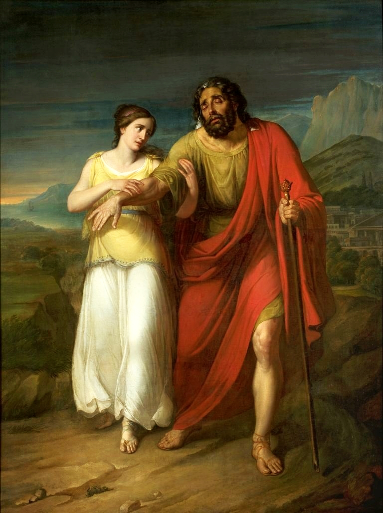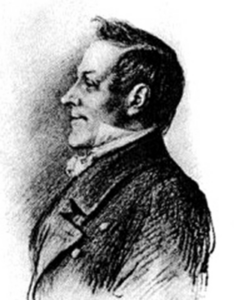Antigone and Oedipus
(Poet's title: Antigone und Oedip)
Set by Schubert:
D 542
[March 1817]
Antigone:
Ihr hohen Himmlischen, erhöret
Der Tochter herzentströmtes Flehen,
Lasst einen kühlen Hauch des Trostes
In des Vaters große Seele wehn!
Genüget, euren Zorn zu sühnen,
Dieß junge Leben, nehmt es hin,
Und euer Rachestrahl vernichte
Die tief betrübte Dulderin.
Demütig falte ich die Hände,
Das Firmament bleibt glatt und rein,
Und stille ist’s, nur laue Lüfte
Durchschauern noch den alten Hain!
Was seufzt und stöhnt der bleiche Vater?
Ich ahn’s, ein furchtbares Gesicht
Verscheucht von ihm den leichten Schlummer,
Er springt vom Rasen auf – er spricht:
Oedip:
Ich träume einen schweren Traum.
Schwang nicht den Zepter diese Rechte?
Doch Hoheit lösten starke Mächte
Dir auf, o Greis, in nicht’gen Schaum!
Trank ich in schönen Tagen nicht
In meiner großen Väter Halle,
Beym Heldensang und Hörnerschalle,
O Helios, dein golden Licht,
Das ich nun nimmer schauen kann.
Zerstörung ruft, von allen Seiten:
“Zum Tode sollst du dich bereiten,
Dein irdisch Werk ist abgetan.”
Antigone:
Oh, exalted heavenly ones, listen to
The implorations flowing from this daughter’s heart:
Let a cool breath of consolation
Waft into my father’s great soul.
To appease your anger, let it be sufficient
That you accept my young life – take it;
And let your beam of wrath annihilate
This deeply distressed suffering woman.
Humbly I clasp my hands in entreaty –
The firmament remains smooth and pure,
And it is quiet, only gentle breezes
Are still setting the ancient grove astir.
Why is my pale father sighing and groaning?
I can sense that a terrible vision
Is driving his light sleep away;
He is jumping up off the grass, he is speaking:
Oedipus:
I have been having a disturbing dream.
Did not my right hand use to wave the sceptre?
But strong forces removed greatness
From you, grey-haired old man, reducing you to worthless froth.
On beautiful days did not I use to drink
In the hall of my great ancestors,
Listening to tales of heroes and the blowing of horns?
Helios, did not I drink your golden light,
Which I now can never behold?
Destruction calls from all directions:
“You need to prepare yourself for death;
Your earthly work is finished.”
All translations into English that appear on this website, unless otherwise stated, are by Malcolm Wren. You are free to use them on condition that you acknowledge Malcolm Wren as the translator and schubertsong.uk as the source. Unless otherwise stated, the comments and essays that appear after the texts and translations are by Malcolm Wren and are © Copyright.
☙
Themes and images in this text:
The ancient world Anger and other strong emotions Bards and minstrels Begging and pleading Breath and breathing Daughters Dreams Drinking Father and child Gold Grass Grey Hands Hearts High, low and deep Horns Kings and Emperors Left and right Light Sighs and sighing Sleep Soul The sun Vengeance Wind Woods – groves and clumps of trees (Hain)
For much of his life King Oedipus thought he knew who he was, and he did his best to avoid fulfilling the awful prophecy that he would murder his father and marry his mother. However, as many versions of the story report (most famously in the tragedy by Sophocles, Oedipus Tyrannus, c429 BCE), when he discovered that unbeknown to him the man he had killed in self defence had been his father, and the Queen he married as a reward for ridding Thebes of the menace of the Sphinx had been his mother, he experienced a moment of enlightenment. On the appalling truth becoming known, Jocasta (his wife / mother) hanged herself and Oedipus took one of her brooches and blinded himself.
From then on he was led around by his daughter Antigone, who eventually brought him towards Athens and the protection of King Theseus. According to another Sophocles play (Oedipus Coloneus, c406 BCE) Oedipus was granted a vision (he was now like Tiresias, the famous blind seer) in which he saw that he would die there by some mysterious and hidden process of transformation. Mayrhofer’s text takes up the story at the point where Antigone and Oedipus have arrived at Colonus, on the outskirts of Athens.

National Museum in Warsaw
One immediately striking feature of the poem is that the two characters never address each other. Antigone is speaking to the higher powers in control of her fate, begging for mercy for her father and imploring to be allowed to die in his place. Oedipus, when he wakes up from his disturbing vision (being blind, he sees thing more clearly now), seems to be speaking to himself in a sort of soliloquy; his comments are not directed towards Antigone, to whom he appears to pay no attention whatsoever.
The two characters are approaching death in different ways. The devoted daughter sees the situation as an opportunity for further self-sacrifice, as a way of finding fulfilment through service. The disturbed father sees only the past and what has been lost – his power and reputation. Since he is now reduced to ‘froth’ he might as well accept the inevitability of total annihilation. Mayrhofer might here be contrasting attitudes to death, with Antigone embodying the Christian approach of redemption through denial and suffering, and Oedipus representing a bleaker, more ‘Classical’ vision with no hope for (or illusion about) an afterlife. The former is presented as feminine; the latter as manly.
How else could a depressive (possibly nihilistic) poet in Metternich’s rigidly Catholic Austria register his rejection of Christian belief in heaven? Since he worked as a government censor Mayrhofer had inside knowledge of what could and could not be published. For those with eyes to see, Antigone and Oedipus would have represented two contrasting approaches to death and Mayrhofer’s implicit rejection of Antigone’s hope for salvation through self-sacrifice would have signalled a rejection of Christianity itself. However, to more naive readers, the poet was simply evoking a classical past and reminding us of the inevitability of death. Shakespeare had resorted to a similar use of classical settings in the late 1590s, when his English history plays had raised alarming parallels with current events and he and his players were at risk of being used to justify subversion. By turning from the abdication of King Richard II to the assassination of Julius Caesar the playwright had managed to continue using drama to ask questions about how legitimate it might be to overthrow tyrants without running the risk of too much trouble from Queen Elizabeth I’s spies. Mayrhofer’s selection of figures from ancient Greece to act as the voice of his own poetry should be seen in similar terms. The imperial censor was able to use the figure of Oedipus to express the unutterable and to print the unpublishable.
☙
Original Spelling and notes on the text Antigone und Oedip Antigone: Ihr hohen Himmlischen erhöret Der Tochter herzentströmtes Flehen: Laßt einen kühlen Hauch des Trostes In des Vaters1 große Seele wehn. Genüget, euren Zorn zu sühnen, Dieß junge Leben - nehmt es hin; Und euer Rachestrahl vernichte Die tief betrübte Dulderin. Demüthig falte ich die Hände - Das Firmament bleibt glatt und rein, Und stille ist's, nur laue Lüfte Durchschauern noch den alten Hain. Was seufzt und stöhnt der bleiche Vater? Ich ahn's - ein furchtbares Gesicht Verscheucht von ihm den leichten Schlummer; Er springt vom Rasen auf - er spricht: Oedip: Ich träume2 einen schweren Traum. Schwang nicht den Zepter diese Rechte? Doch Hoheit lös'ten starke Mächte Dir auf, o Greis, in nicht'gen Schaum. Trank ich in schönen Tagen nicht In meiner großen Väter Halle, Beym Heldensang und Hörnerschalle, O Helios, dein golden Licht, Das ich nun nimmer schauen kann? Zerstörung ruft von allen Seiten: "Zum Tode sollst du dich bereiten; Dein irdisch Werk ist abgethan." 1 The 1824 edition of Mayrhofer's works reads 'In Oedips große Seele wehn'. It is impossible to know if Schubert changed 'Oedips' to 'des Vaters' himself when setting the text to music or whether he was working from an earlier draft of the text. 2 1824: träumte (past tense - I dreamed)
Confirmed by Peter Rastl with Gedichte von Johann Mayrhofer. Wien. Bey Friedrich Volke. 1824, pages 163-164.
To see an early edition of the text, go to page 163 [177 von 212] here: http://digital.onb.ac.at/OnbViewer/viewer.faces?doc=ABO_%2BZ177450902


